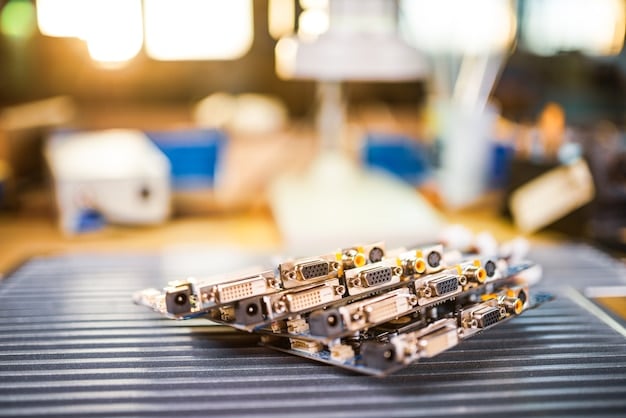Automakers’ $10 Billion US Battery Investment: An Exclusive Report

Exclusive Report: Automakers are investing $10 billion in US battery production facilities to accelerate the transition to electric vehicles and secure domestic battery supply chains.
The automotive industry is undergoing a massive transformation, with electric vehicles (EVs) poised to dominate the future. To support this shift, automakers are making unprecedented investments in battery technology and manufacturing. A new Exclusive Report: Automakers Investing $10 Billion in US Battery Production Facilities reveals the scale of this commitment, highlighting the key players and projects driving the electric revolution in America.
Automakers’ Electric Push: A Billion-Dollar Bet on Batteries
The race to electrify the automotive industry is accelerating, and batteries are the new gold. Automakers recognize that controlling the battery supply chain is crucial for their success in the EV market. This realization has led to a massive wave of investments in US-based battery production facilities.
These investments are not simply about building factories; they represent a strategic move to secure a competitive advantage in the rapidly evolving EV landscape. By establishing a strong domestic battery production capacity, automakers aim to reduce their reliance on foreign suppliers, lower transportation costs, and create jobs in the United States.
Key Drivers of Battery Investments
Several factors are driving the surge in battery investments. Government incentives, growing consumer demand for EVs, and the need for greater supply chain resilience are all playing a significant role.
- Government Support: The US government is offering substantial incentives to encourage domestic battery production, including tax credits and grants.
- Consumer Demand: The increasing demand for EVs is creating a need for more batteries, prompting automakers to expand their production capacity.
- Supply Chain Security: Automakers are seeking to reduce their reliance on foreign suppliers by establishing a domestic battery supply chain.
The confluence of these factors is creating a favorable environment for battery investments in the United States.

These investments signify a pivotal shift in the automotive industry, paving the way for a future where electric vehicles are more accessible and sustainable.
Leading the Charge: Automakers’ Battery Production Initiatives
Several major automakers are leading the charge in building US battery production facilities. These initiatives range from joint ventures with battery manufacturers to wholly owned production plants.
These projects represent a significant commitment to the US economy, creating thousands of jobs and boosting local communities. Automakers are not only investing in battery production but also in research and development to improve battery technology and lower costs.
Prominent Automakers Investing in US Battery Production
Here’s a look at some of the key players and their battery production initiatives:
- General Motors (GM): Partnering with LG Energy Solution to build multiple Ultium Cells battery plants in the US.
- Ford Motor Company: Collaborating with SK Innovation to establish BlueOval SK, a joint venture focused on battery production.
- Stellantis: Teaming up with Samsung SDI to build a battery plant in Indiana.
These partnerships demonstrate the collaborative nature of the battery industry, with automakers working alongside established battery manufacturers to accelerate the development and production of advanced battery technologies.
The investments made by these automakers will not only boost battery production capacity but also drive innovation and technological advancements in the field.
Job Creation and Economic Impact
The influx of investments in US battery production facilities is expected to have a significant positive impact on the economy. These projects will create thousands of jobs in manufacturing, engineering, and related fields.
In addition to job creation, the battery industry will also generate significant economic activity in local communities. The construction and operation of battery plants will support local businesses and increase tax revenues.
- Manufacturing Jobs: Battery plants will require a skilled workforce to operate and maintain equipment.
- Engineering Positions: Research and development activities will create opportunities for engineers and scientists.
- Support Services: Local businesses will benefit from the increased demand for goods and services from battery plants and their employees.
The economic benefits of the battery industry extend beyond direct job creation and contribute to the overall prosperity of the communities in which these facilities are located.

With job creation and economic stimulus, the automotive industry is bolstering not only green technology, but the American economy as well.
Challenges and Opportunities in the US Battery Market
While the US battery market presents tremendous opportunities, it also faces several challenges. These include the need to secure raw materials, develop a skilled workforce, and address environmental concerns.
Overcoming these challenges will require collaboration between automakers, battery manufacturers, government agencies, and educational institutions. By working together, stakeholders can create a sustainable and competitive battery industry in the United States.
Key Challenges Facing the US Battery Market
Here’s a closer look at some of the key challenges:
- Raw Material Sourcing: Securing a reliable and sustainable supply of raw materials, such as lithium, nickel, and cobalt, is crucial for battery production.
- Workforce Development: Training and educating a skilled workforce to operate and maintain battery plants is essential.
- Environmental Sustainability: Minimizing the environmental impact of battery production and disposal is a key concern.
Addressing these challenges will require innovative solutions and a long-term commitment to sustainability.
With proper planning and execution, the United States can establish itself as a global leader in battery technology and manufacturing.
The Future of US Battery Production
The future of US battery production looks bright, with continued investments and technological advancements expected in the coming years. As the demand for EVs continues to grow, the need for batteries will only increase, driving further expansion of the industry.
Innovation will also play a crucial role in shaping the future of battery production. Researchers are working on developing new battery technologies that are more energy-dense, safer, and more sustainable.
- Solid-State Batteries: These batteries offer improved safety and energy density compared to traditional lithium-ion batteries.
- Lithium-Sulfur Batteries: This technology promises higher energy density and lower costs.
These advancements will enable automakers to produce EVs with longer ranges, faster charging times, and lower prices, further accelerating the adoption of electric vehicles.
With ongoing investments and technological breakthroughs, the US battery industry is poised for continued growth and success.
Impact on Global Automotive Industry
The surge in US battery production will have a significant impact on the global automotive industry. By establishing a strong domestic battery supply chain, the United States is reducing its reliance on foreign sources and becoming a more competitive player in the global EV market.
This shift will also encourage other countries to invest in their own battery production capabilities, leading to a more diversified and resilient global battery supply chain.
- Increased Competition: The emergence of a strong US battery industry will increase competition among battery manufacturers worldwide.
- Supply Chain Diversification: A more diversified battery supply chain will reduce the risk of disruptions and ensure a more stable supply of batteries for automakers.
- Technological Innovation: The global competition in the battery industry will drive further technological innovation and lead to better batteries for EVs.
The rise of the US battery industry is a game-changer for the global automotive landscape, creating new opportunities and challenges for automakers and battery manufacturers alike.
These large-scale investments in domestic facilities promise to fortify the U.S. position in the global EV race, fostering innovation and economic growth.
| Key Point | Brief Description |
|---|---|
| ⚡ Automakers’ Investments | US battery production facilities are receiving significant investments from major automakers. |
| 🏭 Job Creation | The battery industry is expected to generate thousands of jobs in manufacturing and engineering. |
| 🌱 Sustainable Future | The shift to EVs and domestic battery production supports a more sustainable transportation sector. |
| 🌐 Global Impact | US battery production will impact the global automotive industry, increasing competition and innovation. |
FAQ
▼
Automakers are investing to secure battery supply, reduce reliance on foreign sources, and capitalize on government incentives.
▼
The investments are expected to create thousands of jobs in manufacturing, engineering, and related services.
▼
Challenges include securing raw materials, developing a skilled workforce, and addressing environmental concerns.
▼
The future looks promising with continued investments and technological advancements, leading to industry expansion.
▼
US production will increase global competition, diversify the supply chain, and drive further technological innovation.
Conclusion
The $10 billion investment by automakers in US battery production facilities signals a monumental shift towards electric mobility and strengthens the nation’s position in the global automotive landscape. This move not only promises a more sustainable future but also boosts economic growth and creates numerous job opportunities, ensuring that the US remains at the forefront of the electric vehicle revolution.





